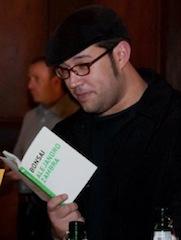This is the first in an occasional series of interviews of young, smart booksellers who are both the present and the future of bookselling--and whose enthusiasm and presence are encouraging many older folks in the industry who feared they might be a dying breed. Our intrepid reporter is George Carroll, an independent publishers rep and principal of Redsides Publishing Services. Jeff Waxman, 26, is a bookseller at the Seminary Co-op's 57th Street Books in Chicago, a promotions manager at the University of Chicago Press and an erstwhile reviewer of books and editor of reviews. He began working at the Seminary Co-op Bookstores in 2007.
Jeff Waxman, 26, is a bookseller at the Seminary Co-op's 57th Street Books in Chicago, a promotions manager at the University of Chicago Press and an erstwhile reviewer of books and editor of reviews. He began working at the Seminary Co-op Bookstores in 2007.
You work for arguably the best academic bookstore and the most prestigious university press in the country. Have you peaked early?
If this is the pinnacle, how could I possibly complain? So far, it’s been my honor to work with people I admire while doing the things I love. One should be so lucky, right? If I can still say that at the end of my life, then my only regrets will be the five or ten times I’ve left the house without a book in hand.
You're involved with the Best Translated Book Award and you do publicity and marketing for Seagull Books, among others. What started your interest in literature in translation?
The short answer is this: I got started in publishing when I worked at Dalkey Archive Press and it was there that I learned how few publishers were putting out original translations and how high the barrier for translation into English has become. But because of that extra barrier, because of the cost and effort of finding that special book and translating it, only some very serious talents make the trip. In translation, you’re really getting the best of world literature.
Do you read other languages?
I read only in English, so I gravitate toward that. It's almost always enough and I am comforted by the fact that my parochialism feeds hungry translators. It's thanks to talented translators that I don't have to ask where a book is from before I let myself read it and love it. And when I read it, I only really have to ask myself if it's good.
Seems that more than one thing needs to happen for a book to reach its market--the New York Times, the Wall Street Journal, the New York Review of Books aren't always enough. How do you reach nontraditional media?
I always thought that the review media was the nontraditional way for books to come to market. Talking about books with friends at parties, singing their praises to strangers in cafes, arguing about them in the street--I think that’s the traditional way for a book to be discovered.
Can you say something about the value of social networking?
I don't know exactly what social networking is or what it isn't. So many of my friendships are built first on a shared affinity for books that I don't know where friendship stops and "networking" starts. I'm not alone in this, either. The University of Chicago Press has a great book coming out this summer--Solidarity in Strategy by Lyn Spillman--that addresses this sense of community in the professional world.
I think the separation of work from life is for people who hate one or the other or both, or for people who are just completely turned off from nine to five. That separation is not for me and it's not for most of my friends in publishing and bookselling. This is our life’s work. We're not just warming the bench and paying rent, we're keeping the fires lit, maintaining a civilization.
What future do you foresee for the printed book?
Ceaseless. Unending. Constant. Damn near eternal on acid-free paper. Even in some kind of Twilight Zone scenario in which I'm the only one left, I'll print the books myself. Broken glasses and all. It might not be pretty.

